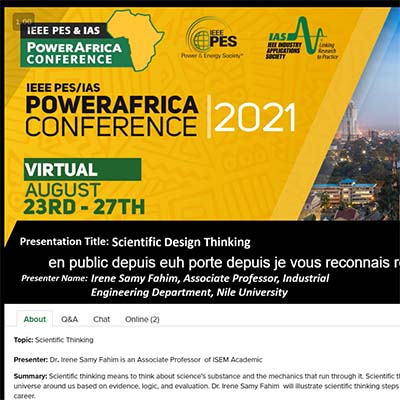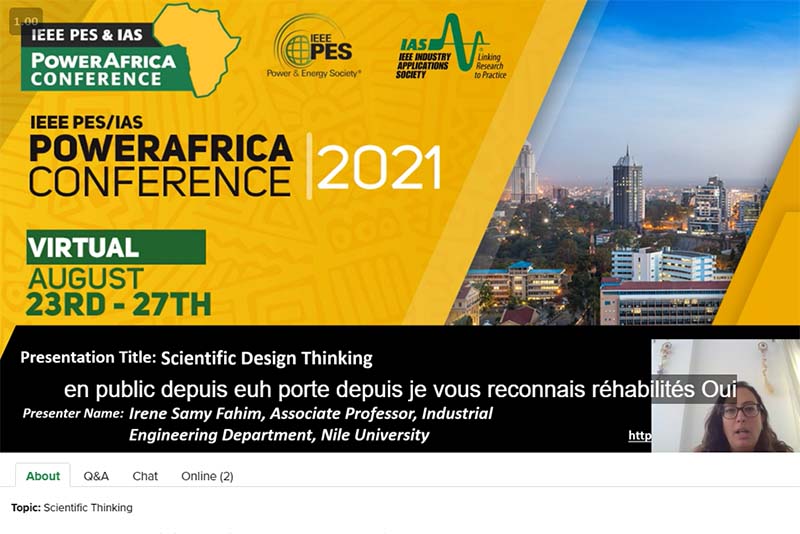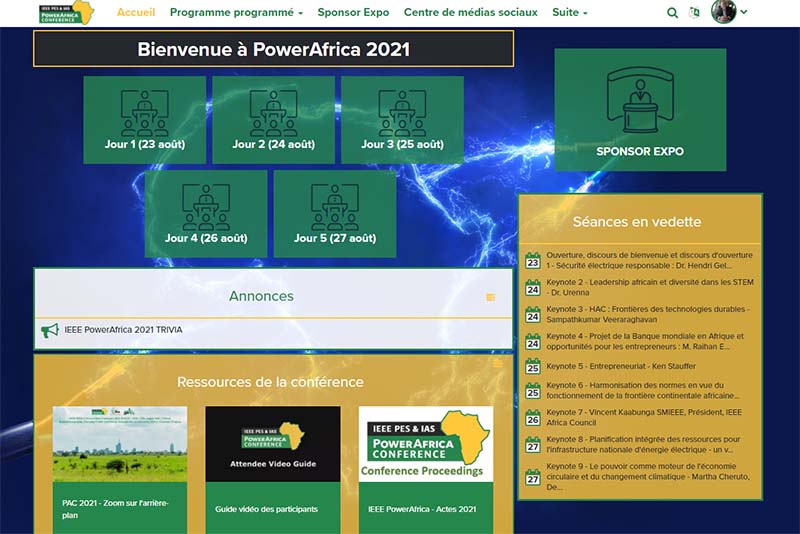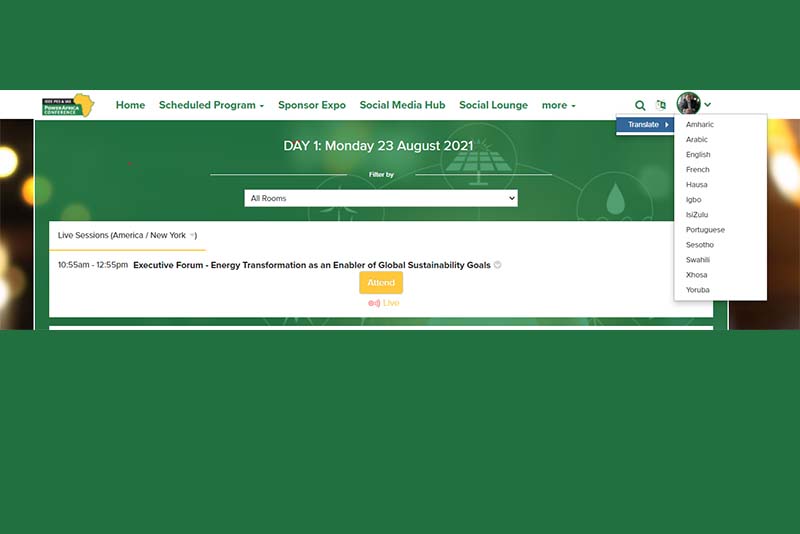
Filed in: Virtual & Hybrid Event Case Studies Tag: Case Studies
In August 2021, IEEE PES/IAS PowerAfrica (PAC 2021) went virtual for the second year in a row. Co-sponsored by the IEEE Power and Energy Society (PES) and the Industrial Applications Society (IAS), PAC 2021 is the premier forum for sharing innovations in power systems integrations for the African continent. With a successful 2020 event behind them, the Organizing Committee, led by General Chair, Humphery Muhindi, took the 2021 event as an opportunity to innovate, increase engagement, and explore new virtual event approaches. Language translation, exhibitor innovations, entrepreneurship, short paper tracks to spur ideas, and close group discussions, all played roles in the event’s success.
The Committee organized the 2021 event under the theme of “Regional Integration, Emerging Trends and Energy Sustainability in Advancing Africa’s Economic Progress.” The conference featured pre-recorded and live content and included a Technical Program, an Industry Program, a Smart Village Program, and a sponsored Exhibit Hall. To help realize their vision, the Committee enlisted the MCE Digital Events (MCE DE) Team to design and produce the event.
PAC 2021 brought together just under 400 participants from around the world. To support multilingual participants at this year’s event, the Committee offered translation services. With the help of an outside vendor, PAC 2021 featured translations of all written content on the Engagez virtual platform in 11 different languages.
Authors presented 180 papers during the Technical Program, which contained eight tracks. Presentations included both full research papers as well as short papers highlighting initial or final research. The Short Paper Track welcomed discussions of field experiences, case studies, and evaluation results. The event program featured exciting discussions on issues impacting African communities, such as the feasibility of offshore wind power for Namibia and the viability of the Nigerian solar PV market.
PAC 2021 also included opportunities for postgraduates to share their research and connect with peers. In addition to a dedicated Postgraduate Track for papers, the program featured five Ph.D. Forums with content tailored for postgraduate students, recent graduates, and prospective students in energy fields. The Forums covered topics like finding your research gap and data visualization techniques.
Technical Program Workshops enabled participants to join focused, small group discussions on advancements in Power. The three workshops addressed both technical topics as well as best practices and case studies. Participants could join workshops on protection and fault analysis of microgrids or creating electrification and energy access in rural and suburban areas.
At the Industry Forum, practicing professionals stayed up-to-date with the latest trends and product innovations in Power and Energy Sectors. Leaders in the field offered keynotes on topics like universal electricity access under the net-zero carbon future and resource planning for the national electric power infrastructure. Panel sessions highlighted how women engineers are shaping sustainable development and how standards are enabling power systems transformation. Participants also gained hands-on experience during four industry tutorials on topics like arc flash safety and reliability and grid simulation.
Senior professionals gathered at the live Africa Executive Forum. Participants of the Forum exchanged ideas and provided thought leadership on how technology can address issues affecting the African continent. Through their advocacy and influence, these leaders will be a strong force for capacity building and change.
Participants of the Smart Village Program at PAC 2021 could try their hands at several competitions. The IEEE Smart Village Next Generation (ISVx) Student Paper Competition granted financial awards to students and their host institutions for paper submissions on “Water-Energy-Food Nexus in Africa – Technology, Applications, Benefits, and Challenges.” At the Meet the Entrepreneur competition, innovators could pitch videos to the IEEE Smart Village Community on driving change in energy, education, and enterprise development over the next decade.
The IEEE Smart Village (ISV) New Talents Program provided opportunities for talented individuals who aspire to become Smart Village Developers. These Developers are passionate entrepreneurs working to provide electricity in the most vulnerable communities in the world. Selected applicants received leadership opportunities and financial support to participate in the 2021 conference and upcoming Smart Village Workshops.
At the close of each day, participants decompressed and mingled with peers during scheduled networking sessions. Using the SpatialChat tool, participants met up with fellow attendees to chat about their research, share local challenges, and discuss the latest breakthroughs in the field.
In the Exhibit Hall, participants engaged with energy leaders like the IEEE Standards Association, NEI Engineering, IncSys, and ETAP. Participants were so impressed with the exhibit hall that other IEEE conferences are interested in working with the MCE DE team to replicate exhibitor booth designs at their upcoming virtual events.
The 2021 PAC virtual event provided a platform for top researchers to discuss local challenges and share ideas for the future. General Chair Humphery Muhindi shares, “Through our robust technical program, strong industry participation, and focus on supporting local communities, we were able to deliver an engaging virtual experience for participants and shape energy sustainability in Africa.”


